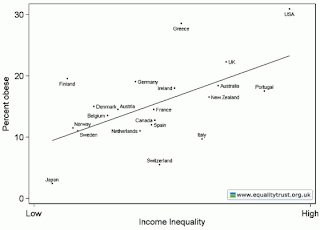Obesity is increasing rapidly in the Western world. In the 1980s, approximately 40% of the UK population were overweight and less than 10% were obese. Now two-thirds of adults are overweight and more than a fifth are obese.
In the monumental book Spirit Level, Richard Wilkinson and Kate Pickett dedicate a fascinating chapter to exploring the causes behind this “obesity epidemic” and conclude that obesity levels tend to be lower in countries where income differences are smaller.
 This plague of portliness has caused a major health crisis in the developed world as higher obesity levels has seen the ballooning of those suffering from heart disease, diabetes and various cancers. Increasing numbers of obese children will lead to lower life expectancy and place additional strain on an already underfunded and undervalued NHS. Furthermore, obesity further erodes psychological and mental well-being.
This plague of portliness has caused a major health crisis in the developed world as higher obesity levels has seen the ballooning of those suffering from heart disease, diabetes and various cancers. Increasing numbers of obese children will lead to lower life expectancy and place additional strain on an already underfunded and undervalued NHS. Furthermore, obesity further erodes psychological and mental well-being.Historically, being fat has been associated with being rich. Rich people didn’t need to engage in manual labour and they could afford to gorge on various decadent delights. Conversely, the poor would work long, strenuous days and could afford, if anything, only the most basic food. Whilst the rich were often fat cats; the poor were more likely to be malnourished and suffer from debilitating disease.
 As the Western world has moved to a post-industrial economy, however, obesity has changed its social distribution. For a variety of reasons – as laid out in Spirit Level – working-class people are now far more likely to be overweight than middle-class people.
As the Western world has moved to a post-industrial economy, however, obesity has changed its social distribution. For a variety of reasons – as laid out in Spirit Level – working-class people are now far more likely to be overweight than middle-class people.This phenomena has been coupled with an overt and covert media assault on the corpulent classes. We have seen an explosion of voyeuristic television programmes laughing at a variety of (usually working-class) overweight subjects – Too Fat Too Young, The 34 Stone Teenager, Fat Club, Big Meets Bigger, The Biggest Loser, Can Fat Teens Hunt? – in a grotesque echo of the Victorian freak show. Tabloid newspapers, trashy magazines, the fashion industry and celeb culture fortify the maxim that thin is beautiful and fat is horrible. The ubiquitous media tells us that fat is wrong but, at the same time, the omnipresent advertising industry tells us to devour more and more unwholesome junk. Well you can't have your cake and eat it! Or maybe you can...
As Polly Toynbee notes, “fat is a class issue” – but this pervasive demonisation is much more subtle than overt class war and is compounded by the media’s desire to reduce everything to the lowest common denominator. Like an exquisite meal, everything the media regurgitates has to be easily digestible.
A prime example of this is the clever satire of Have I Got News For You relentlessly attacking John Prescott – one of the few working class members of Blair’s government – for being overweight. Prescott was never overtly mocked for being working class, but that was the underlying subtext – especially when scoffing at Prescott’s lack of lingual dexterity. The implicit implication is that politics is no place for people who haven’t had a public school or Oxbridge education. Indeed, the whole media feeding frenzy around fat people is thinly veiled class war and represents another way for the establishment to both profit from and undermine the working-class.
